Source: United States Senator for New Jersey Cory Booker
WASHINGTON, D.C. — U.S. Senators Cory Booker (D-NJ), a member of the Senate Committee on Small Business and Entrepreneurship, and Mazie Hirono (D-HI) today reintroduced legislation that invests in startup accelerators and incubators in new and underserved areas. Research indicates that just three geographic clusters — the San Francisco Bay area, the Boston-Washington corridor, and Southern California—account for 77 percent of venture capital funding in the United States, driving small business job growth to thrive in these areas and leaving rural, low-income, and other underserved areas behind.Companion legislation was introduced in the House by U.S. Representatives Lisa Blunt Rochester (D-DE, At-Large) and Brian Fitzpatrick (R-PA-1).
Incubation and accelerator programs, which provide entrepreneurs with essential services such as experienced leadership, office space, access to financing opportunities, and structured mentorship for certain periods of time, are critical elements of innovation ecosystems where successful startups can flourish. According to research conducted at MIT, areas in which an accelerator opens see a 97 percent increase in the number of distinct venture capital investors compared to similar areas without an accelerator.
“When we fail to get entrepreneurs the resources they need to scale their businesses, regardless of their zip code or wealth, we leave some of the best ideas and innovations on the sidelines,” said Sen. Booker. “To aid in our country’s long term economic recovery, our bill will make robust investments to help fund new startup programs in low-income and underserved areas, providing more entrepreneurs with the support they need to launch their businesses and create jobs.”
“Every day across our country, small businesses and entrepreneurs drive innovation and growth, and create jobs,” Senator Hirono said. “The SOAR Act is a critical opportunity to provide more businesses and entrepreneurs with the resources they need to succeed—regardless of where they may be located. Passing this legislation would help as we continue to focus on our economic recovery from the pandemic.”
“Our economy is driven by the entrepreneurs and small businesses who are investing in innovation for the future,” Blunt Rochester said. “By investing in programs like SOAR, we can drive economic growth in underserved areas and further empower entrepreneurs, including women, minorities, veterans, and individuals with disabilities. I’m thrilled to be introducing this bill with Senator Booker and Congressman Fitzpatrick and I’m hopeful that together, we can shepherd this bill to passage.”
“We know growth accelerators work at stimulating investment and job creation but too often those gains are concentrated and leave American workers and entrepreneurs in underserved areas behind,” said Fitzpatrick. “Working with Congresswoman Blunt Rochester, we’ve come up with a measure to support growth in underserved communities – wherever they are – by empowering entrepreneurs with essential services like experienced leadership, office space, access to financing opportunities, and structured mentorship. Together we can plant the seeds of nationwide growth.”
The SOAR Act builds on a U.S. Small Business Administration (SBA) Growth Accelerator Fund competition, in which accelerators and other entrepreneurial ecosystems compete for funding to expand their reach to engage more startups and new communities.
By broadening the tech ecosystems, the SOAR Act would unleash economic opportunities in low-income and rural communities and empower underserved entrepreneurs, including women, minorities, veterans, and individuals with disabilities.
Specifically the SOAR ACT would build on the SBA’s work with the Growth Accelerator Fund and authorize $80 million in funding each year for 10 years, providing:
- Funding offered through a competitive grant program for organizations supporting early-stage startups including new and existing accelerator programs, incubators, and universities
- A targeted focus on encouraging growth accelerators that address key geographic and demographic gaps, including women, veterans, minority-entrepreneurs, individuals with disabilities, and rural communities
- Increased funding, which will allow the SBA to continue to expand the strength of growth accelerators across the country
- Oversight and transparency of the program
###
